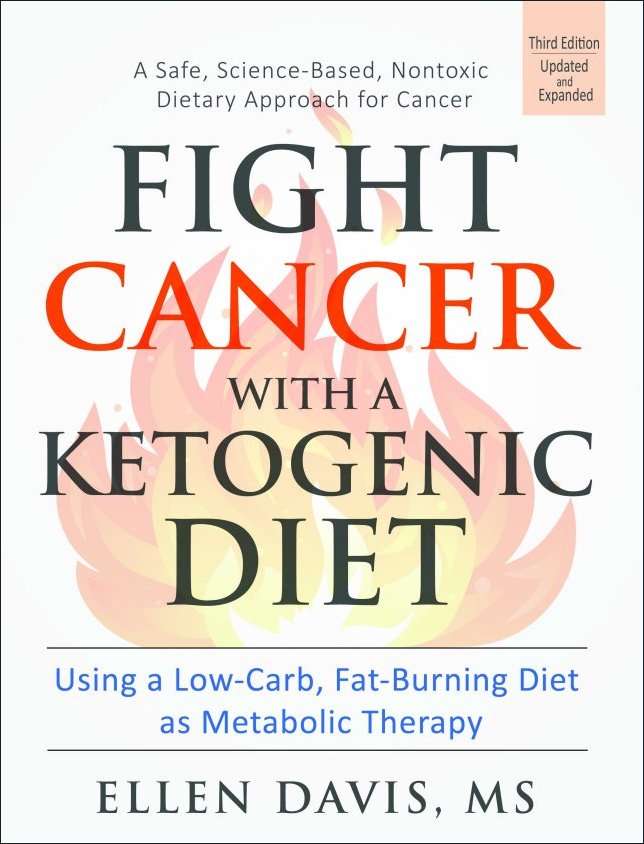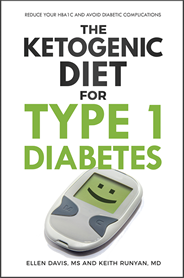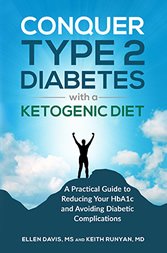Low Carb Dieting Myths
Updated September 16, 2020. Medical review by Albert J Hart, MD
The myths about low carb dieting and specifically ketogenic diets abound in the American collective consciousness. These are just a few of the most pervasive myths I've encountered, with explanations as to why they are incorrect and simply don't make sense, scientifically:
Myth 1: Carbs are an essential nutrient for good health.
Some nutrition professionals still believe that carbohydrates are necessary to provide glucose to fuel the brain and avoid hypoglycemia. It's an old way of thinking, and it's just not true scientifically. Essential nutrients are nutrients which your body cannot make, so they have to be obtained on a daily basis from your food sources. There are essential proteins, and essential fatty acids, but there is no such thing as an essential carbohydrate.
When the body is in ketosis, it has a “glucose sparing” effect. First, the skeletal muscles burn fatty acids preferentially which spares glucose for the brain to use. Second, once a person is keto-adapted, the brain switches to using ketone bodies for over half of the fuel it needs, and less glucose is needed since ketone bodies are being used as an alternative fuel.

This small amount of carbohydrate (glucose or blood sugar) needed to fuel the brain during keto adaptation can be generated internally. Your liver can make all the glucose needed for brain function from glycogen stored in the liver. And if need be, the body can also make glucose from the protein in your food.
Hence, carbohydrates are NOT essential nutrients, and many people, such as the Inuit of Alaska and the Masai of Africa live without them for long periods of time without any effect on health and well-being. The “brain needs carbs” idea is only true if you consistently eat a high carb diet (as most registered dietitians will tell you to do). You will be "carb-adapted", and there will be little or no ketones for your brain to use as an alternative fuel, since a high carb diet interferes with ketosis.
However, the fact that carbs aren't essential doesn't mean that everyone should eat a low carb diet. There are people who can tolerate eating large amounts of carbohydrates on a daily basis. However, there are also people who can't. These people have a low tolerance for carbohydrates, and if they eat large quantities of them, they develop metabolic disorders like insulin resistance and diabetes.
If you can eat large amounts of carbohydrates without developing any metabolic issues, go for it. But it is a fact that humans can avoid the consumption of dietary carbohydrate and continue to maintain perfect health. We have evolved with a dual energy system in which the brain and other body systems can use ketone bodies from fatty acids for fuel when carbohydrate intake is low.
And here's an interesting fact: The Dietary Reference Intakes for Energy, Carbohydrate, Fiber, Fat, Fatty Acids, Cholesterol, Protein, and Amino Acids (Macronutrients)(2005) is a standard written resource for the dietetic profession. Even this publication says on page 275:
"The lower limit of dietary carbohydrate compatible with life apparently is zero, provided that adequate amounts of protein and fat are consumed."
Myth 2: There's a danger of vitamin deficiencies with low carbohydrate diets. You definitely won't get enough Vitamin C.
Not true, see my Facts about Vitamins page and my Vitamin C Deficiency page.
Myth 3: Ketogenic diets cause your body to go into ketosis, which is dangerous.
Not true, the person who says this is confusing ketosis with ketoacidosis. For more information, see my ketosis and ketoacidosis pages.
Myth 4: Your kidneys will sustain damage from the high protein consumption.
Whenever someone says this, I know they have never read any of the low carb, ketogenic diet books available. They are just parroting what they've heard from someone else. Low carb diets, and especially ketogenic diets, are NOT high protein diets. They are HIGH FAT diets, with moderate protein consumption. And there is plenty of evidence in the research literature which shows that in healthy people with no prior kidney disease, eating extra protein is perfectly safe, and will NOT harm your kidneys. See this study and this study.
Myth 5: A low carb, high protein diet will cause the body to excrete calcium, and result in osteoporosis.
As stated in Myth 4, a ketogenic diet is NOT a high protein diet. It's a high fat, moderate protein diet. Regardless of that fact, protein consumption is essential for good bone health. This paper indicates that in addition to calcium in the presence of adequate vitamin D, proteins are a key nutrient in the prevention of osteoporosis. In addition, the paper states that low protein intake is often observed in patients with hip fractures and that a deficiency in dietary protein causes marked deterioration of bone mass and strength. So, in fact, a higher protein intake correlates to a stronger, denser bones. This paper, this paper and this paper also support these statements.
So what does cause bone loss? There are several suspects:
- A magnesium deficiency
- High fructose consumption
- Gluten intolerance associated with grain consumption
- Vegetable oil consumption, especially corn oil

Myth 6: A high fat, ketogenic diet will clog your arteries and give you heart disease.
This, I think is the biggest myth associated with low carb, ketogenic diets. It's based on the lie that saturated fat and cholesterol cause arteriosclerosis and heart disease. There has never been any scientific study published or unpublished which links cholesterol and saturated fat to heart disease. Shocking but true. In fact, this 2010 meta-analysis distinctly destroys any link between heart disease and saturated fat.
And this study showed that low carb diets actually improve heart disease markers over other types of diets.
And here's another study which looks directly at how a ketogenic diet favorably affects blood test results for heart disease.
And one more recent study from Johns Hopkins University School of Medicine confirms that a higher fat, low carb diet is not detrimental to vascular health AND results in faster weight loss. The authors confirmed that the dieters in the low carb group dropped more weight over a shorter period of time than the higher carb group, and the low carb group had no harmful changes in vascular health.
In contrast, there are tons of studies showing that a high carbohydrate diet and elevated blood sugar and insulin are highly associated with inflammatory heart disease. For instance, consider a blood test called the Hemoglobin A1C (i.e., the HbA1c). It's basically a measure of your average blood sugars for the 3 months preceding the test.
In the EPIC study, the authors looked at the relationship between the Hemoglobin A1c test results and the risk of heart attack. The results were very clear: the higher a person's HbA1c levels, (i.e., the higher the average blood sugars) the higher the risk of heart attack. See this post and the study results here.
Dr. Jeff Volek gives a great overview of how a ketogenic diet affects total cholesterol, HDL, LDL and triglycerides in this video:
Myth 7: Antioxidants and phytonutrients from plants are important for good health, and a ketogenic diet lacks these chemicals.
Incorrect. See my Antioxidant Foods page.
Myth 8: Complex Carbohydrates are the "good carbs" and it's healthy to include them in your diet.
Not so much. See my Complex Carbs page.
Myth #9: Low carb diets cause muscle wasting.
Not true. In fact, low carb diets are better at preserving and even increasing lean muscle mass. In this study published in 1984, a team of scientists from MIT and Harvard studied two groups of overweight women. They put one group on a low carb diet, and the other group on a high carb diet. Each diet allowed 700 calories per day. Even with a severe caloric deficit, the greater percentage of protein consumed on the low carb diet and the effects of ketosis resulted in a greater retention of muscle mass for the subjects on the low carb diet. In other words, the subjects on the high carb diet loss more muscle mass because the carbs they were eating displaced some of the protein that would have helped them retain muscle mass.
This phenomenon of how dietary protein helps the body retain muscle mass has been shown many times over in various studies on very low calorie diets which include adequate protein and muscle building substrates such as sodium and potassium. See this study, this study, and this study.
This general "muscle wasting" assertion often comes from trainers and dietitians who really have not studied the science on muscle preservation. They will tell you that the brain requires at least 100 grams of carb per day and if you don't get those carbs in the diet, your body will break down your muscles to get it. This is true if one's diet is high carb, insulin and blood sugar are high, and no ketone bodies are available as an alternative source of brain fuel.
But for a person who is adapted to a low carb, ketogenic diet, ketosis provides fuel in the form of ketone bodies for the brain, and the requirement for glucose drops to only about 40 grams per day. The body can easily make this amount from dietary protein and glycerol from the break down of fatty acids. In addition, Drs Steve Phinney and Jeff Volek have shown that being in nutritional ketosis increases the amounts of branched chain amino acids such as leucine in the blood and this translates into a better preservation of muscle mass. See their book "The Art and Science of Low Carb Performance".
Myth #10: The weight loss from low carb, ketogenic diets is not real. It’s only water loss.
It is true that in the initial week or so of a ketogenic diet, some of the weight loss will be water loss, as your body adapts to the new lower carb diet, and gets busy re-engineering the cellular enzymes needed to burn fat instead of carbohydrate for fuel.
It has been known for years that fasting in general, and cutting carbohydrate intake (which is a milder form of fasting, metabolically speaking) results in water loss because blood sugar, insulin, and glycogen stores (excess sugar stored in your muscles and liver) are reduced. As blood sugar and insulin levels come down, the kidneys dump excess water and sodium from the body.
Put another way, water retention and high blood pressure are common side effects of a high carb diet, because a high carb diet causes the kidneys to retain salt, which causes the body to retain water. Going on a low carb, ketogenic diet is an excellent way to reduce water retention and blood pressure.
After a week or so on a ketogenic diet, your body will become “keto-adapted”, and water loss will stabilize, as long as you are getting enough sodium and other minerals to replace the ones lost in the bathroom. At this point, fat loss accelerates and becomes the primary source of fuel.
The water loss effects of dizziness and weakness at the beginning of a low carb diet can be avoided by making sure you get plenty of salt (at least 5g/day) and extra potassium and magnesium in your diet.
In the MIT/Harvard study discussed previously, the low carb group participants were given 5 grams of salt each day to offset the natural loss associated with lower carb consumption. Note that there was no difference in water loss between the low carb and the high carb group at the conclusion of the study, and both groups lost the same amount of weight.
In addition, this survey showed that in just one low carb internet group, over 1400 people had lost weight and kept it off using a low carb diet.
The next myth is closely related..
Myth #11: Low carb diets don't work because as soon as you go off of the diet, you gain all the weight back.
Not much of a criticism since this is true for any "diet", but still this argument is brought out. The real issue here is that "diets" of any kind don't work over time.
Change only works over the long term if it becomes the normal behavior.
The point here is that reducing your carbohydrate intake should be viewed as a permanent change in your eating habits. If you back slide and return to your old eating habits of high carb foods, you'll end up unhealthy and/or overweight again.
It's pretty basic: for people who can't metabolize carbohydrates correctly, eating a high carb diet causes weight gain and health issues. For those of us in that boat, we have to stay low carb permanently to maintain health and normal weight.
If you look at the studies comparing low carb diets to high carb diets in which the authors concluded there was no difference in weight loss, they neglect to mention that the reason the low carb group didn't do better than the high carb group over time is because the low carb group gradually ate more and more carbs over the study period, and towards the end, were eating almost as many carbs as they did before the study started.
Myth #12: Low carb, ketogenic diets are low in fiber, and so detrimental to your colon.
Incorrect. People who follow ketogenic diets eat more fibrous vegetables than they did when following the standard American diet. In fact, fibrous vegetables such as cabbage, spinach and salads make up a large part of the carb calories allowed on a ketogenic diet. See the results of this survey.
That's my stab at trying to kill the most pervasive low carb dieting myths. I encourage you to read the information and links I've included and decide for yourself if low carb dieting is unhealthy.
Myth #13: Blood cholesterol levels should be less than 180 mg/dl for good heart health.
This editorial in the journal Circulation
discusses the fact that the rates of death from all causes are higher in those
populations with cholesterol levels lower than 180 mg/dl.
This study concluded that "The relative
risk of non-cardiac death was 2.27 times higher in the low cholesterol group
than in the controls."
Myth #14: Salt is bad for you.
Increasing salt intake is recommended while low carb dieting. Is that bad? In 1996, the Journal of the American Medical Association published a meta-analysis of 56 clinical trials done since 1980 in people with normal blood pressure, and found that extreme salt reduction had little effect on lowering blood pressure.
In another recent study, the investigators found that the less salt people ate, the more likely they were to die of heart disease. Here's an analysis study which shows that eating less salt increases triglycerides and other hormones in the blood, which increases blood pressure and heart attack risk.
And in a review of another meta-analysis in 2011, an article in Scientific American discussing the analysis stated
"This week, a meta-analysis of seven studies involving a total of 6,250 subjects in the American Journal of Hypertension found no strong evidence that cutting salt intake reduces the risk for heart attacks, strokes or death in people with normal or high blood pressure.”
In addition, recent studies have
discussed a growing state of iodine deficiency in the United States, which may
be the result of the US government's unsound advice that all Americans avoid
eggs and lower salt intake. Worse, there is also evidence that iodine
deficiencies contribute to atherosclerosis and heart disease.
All of my books are available in electronic PDF, and now in paperback on Amazon!
 |
 |
 |
|
Buy paperbook on Buy paperback on Amazon Buy the e-Book via Paypal |
Buy paperback on Buy paperback on Amazon Buy the e-Book via Paypal |
Buy paperback on Buy paperback on Amazon Buy the e-Book via PayPal |